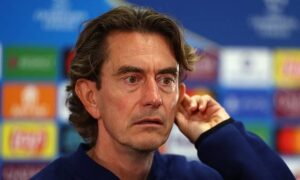Thomas Frank blames Aston Villa clash for causing Spurs drab draw vs Monaco

Tottenham Hotspur’s goalless draw away to AS Monaco in the Champions League was a tense, hard-fought display built entirely on the resilience and brilliance of goalkeeper Guglielmo Vicario.
The Italian shot-stopper delivered another heroic performance, producing a string of crucial saves to help Thomas Frank’s side grind out a valuable 0-0 result at the Stade Louis II. It was a disciplined defensive showing that ensured Spurs remain unbeaten in Europe, but as the dust settled, deeper concerns about focus, energy, and creativity began to surface.
A Night Defined by Vicario’s Brilliance
From the first whistle, Monaco’s fluid and incisive front line — led by Folarin Balogun, Maghnes Akliouche, and Takumi Minamino — kept Tottenham under sustained pressure. Their movement and intensity disrupted Spurs’ attempts to play out from the back, forcing the visitors into risky passes and hurried clearances. Midfielders Rodrigo Bentancur and Joao Palhinha were repeatedly closed down, often left with no choice but to recycle possession sideways rather than pushing the ball forward.
The opening stages were particularly challenging for 18-year-old Archie Gray, who was once again deployed at left-back. The teenager endured a difficult start, caught out of position a few times by Monaco’s overlapping full-backs. However, to his credit, Gray grew into the game, showing impressive maturity, composure, and defensive awareness that belied his age.
Tottenham’s first clear chance came around the 20-minute mark, when Wilson Odobert’s teasing cross found Micky van de Ven at the back post. The Dutch defender rose highest but saw his header loop just over the bar — a rare moment of attacking promise in a match dominated by Monaco’s aggression and tempo.
From that point on, Vicario became the difference-maker. The Italian denied Balogun on three separate occasions before the interval — twice with instinctive low saves and once by rushing off his line to smother a close-range strike. His reflexes and command of the penalty area gave Tottenham a lifeline, ensuring the match remained deadlocked at halftime despite Monaco’s growing momentum.
Second-Half Struggles and Tactical Stagnation
The second half followed a similar script. Spurs continued to sit deep, soaking up wave after wave of Monaco attacks while struggling to string together coherent moves of their own. Although there were fleeting moments of counter-attacking potential, the final ball was consistently lacking. As the game wore on, Tottenham’s pressing intensity noticeably dropped. Players looked fatigued, and their passing became increasingly conservative.
Thomas Frank introduced fresh legs midway through the second half — bringing on Pape Matar Sarr, Brennan Johnson, and Xavi Simons in an attempt to inject energy and creativity. However, the substitutions did little to change the flow of the game. Spurs remained too passive, with long spells of sterile possession that failed to trouble Monaco’s disciplined defensive shape. Too often, there seemed to be just two lines in Tottenham’s setup — a deep backline and an isolated forward line — with the midfield offering little in terms of creativity or forward drive.
Frank’s Post-Match Reflection
Speaking after the match, Frank acknowledged the noticeable drop in intensity and the need to find answers:
> “Good question. Maybe we need to think a little bit more about it and try to come up with an answer. There can be many, many things. It can be a combination of playing a very competitive game against Villa — we performed very well — then to go again. Some haven’t done that too much, some have. It can be just one of those days where you don’t get a top performance. I think the first half was okay, but in the second half, we lacked more.”
His words reflected a growing awareness that Spurs are struggling to maintain consistency in high-intensity matches, particularly when balancing their domestic and European commitments.
Structural Rigidity and the Need for Adaptation
While Thomas Frank’s pragmatic approach has brought a new level of defensive organization to Tottenham, it has also exposed a rigidity in their tactical setup. The team often looks overly structured, lacking the fluidity and unpredictability needed to break down well-organized opponents.
It’s a stark contrast to the style of former boss Ange Postecoglou, whose aggressive attacking philosophy sometimes left the team too exposed. Now, Spurs seem to have swung too far in the opposite direction — overly cautious, too static, and unwilling to take creative risks.
If Tottenham are to progress beyond the group stage and challenge consistently in both the Premier League and Champions League, Frank must find a balance between control and expression. The process — not just the results — will define whether this team can evolve into genuine contenders.
With fixtures against stronger opposition looming, Tottenham can’t afford to rely solely on Vicario’s heroics to secure results. There needs to be a renewed sense of dynamism and attacking courage. Otherwise, as Frank himself admitted, the coming weeks could turn into a long and demanding test of character for both players and coach alike.